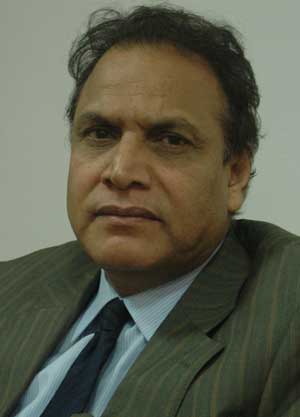SWEDISH SOUTH ASIAN STUDIES NETWORK
Visit to the University Grants Commission (UGC) in New Delhi
Tuesday, November 6, 2007
Web page: http://www.ugc.ac.in/
 The
Indian Government established the University Grants Commission, UGC, in 1956. Since then, it has established
and coordinated standards of teaching, examination, and research in higher
education. UGC serves as a link between the central and state Governments,
and the various education and research institutions. Among its many tasks,
UGC provides recognition for universities in India, disburses grants
to universities and colleges, and grants accreditation to approximately
100 institutions (“deemed universities”), giving them a certain
amount of autonomy with regard to courses, syllabi, and administration.
The
Indian Government established the University Grants Commission, UGC, in 1956. Since then, it has established
and coordinated standards of teaching, examination, and research in higher
education. UGC serves as a link between the central and state Governments,
and the various education and research institutions. Among its many tasks,
UGC provides recognition for universities in India, disburses grants
to universities and colleges, and grants accreditation to approximately
100 institutions (“deemed universities”), giving them a certain
amount of autonomy with regard to courses, syllabi, and administration.
The Indian University Grants Commission was set up after independence along the model of its equivalent in the United Kingdom with a full-time Chairman and other members to be appointed from amongst educationists of repute.
In order to ensure effective region-wise coverage throughout the country, the UGC has decentralised its operations by setting up six regional centres at Pune, Hyderabad, Kolkata, Bhopal, Guwahati and Bangalore. The head office of the UGC is located at Bahadur Shah Zafar Marg in New Delhi, with two additional bureaus in Delhi as well.
The UGC has also, from 1984, been setting up so-called Inter University Centres (IUC), autonomous centres providing common facilities for research, and for various services and programmes to the universities, since heavy investment in infrastructure and input is beyond the reach of the individual university to obtain these facilities. Some of these inter-university centres are: the Inter University Accelerator Centre (formerly Nuclear Science Centre, NSC) in New Delhi; the Inter-University Centre for Astronomy and Astro-Physics (IUCAA) in Pune; and the Inter University Centre for International Studies at Osmania University Campus Hyderabad.
 We visited the large UGC head office building in central Delhi and searched for the Director’s office. Professor Sukhadeo K. Thorat (photo to the right) received us very cordially. He has been connected to the UGC for many years, and became its chairman in February 2006, a position he will keep for five years. Prof. Thorat is the first Dalit to hold the post.
We visited the large UGC head office building in central Delhi and searched for the Director’s office. Professor Sukhadeo K. Thorat (photo to the right) received us very cordially. He has been connected to the UGC for many years, and became its chairman in February 2006, a position he will keep for five years. Prof. Thorat is the first Dalit to hold the post.
He explained how UGC functions and told us that it with regard to international exchange it only operates on a bilateral level. Formal educational exchange programs are organized between countries signed by the two parties. He was very well informed about SASNET and offered to assist us in any way he could.
Prof. Thorat is also Professor of Economics at the Centre for the Study of Regional Development, Jawaharlal Nehru University (JNU) in New Delhi. And in 2002 he was instrumental in the foundation of the Indian Institute of Dalit Studies. His areas of specialisation include agricultural development, poverty, labour studies, caste and economic discrimination, with special focus on discrimination in the labour market and the economic problems of Schedule Castes and Schedule Tribes. He has written extensively on a variety of contemporary issues such as rural poverty, rural development, child labour, caste-discrimination and urban slums. Thorat also has a large of published papers on general economics, agricultural development, rural poverty and related themes to his name.
He still pursues research on his own in these areas, and has been involved in collaboration projects with Swedish researchers, among them Dr. Eva-Maria Hardtmann, Dept. of Social Anthropology, Stockholm University; and Dr. Per Hilding, Dept. of Economic History, Stockholm University.
(Staffan Lindberg and Lars Eklund also met Prof. Thorat – and his wife, Dr. Vimal Thorat – during their SASNET South Asian contact journey in March 2002. Read the report from the meeting.)
SASNET - Swedish South Asian Studies Network/Lund
University
Address: Scheelevägen 15 D, SE-223 70 Lund, Sweden
Phone: +46 46 222 73 40
Webmaster: Lars Eklund
Last updated
2008-01-18
